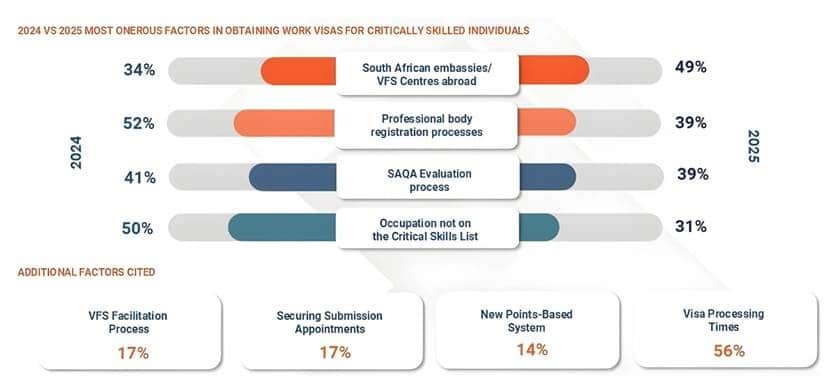FEATURED IN
The newly released 2025 Xpatweb Critical Skills Survey Report, based on the responses from 381 verified employers across multiple sectors, reveals that while recent immigration reforms have eased some visa and work permit hurdles for foreign hires, companies continue to face intense competition in attracting highly skilled talent.
Marisa Jacobs, Managing Director at Xpatweb, says 84% of companies battle to recruit the skilled professionals they need, a jump from 79% in 2024. Talent searches are also intensifying, and it is further evident that both experience and formal qualifications remain decisive in securing professionals for roles – particularly in engineering, ICT, healthcare, STEM education, media and marketing specialists, and artisanal trades.
To stay competitive, the report recommends that South Africa continue streamlining visa and work permit processes, align immigration policy with international best practices, and position itself as a destination of choice for highly skilled and mobile professionals.
The report also outlines how global talent can help unlock economic growth in South Africa. This notion was again emphasised by Deputy Minister of Finance Ashor Sarupen at Xpatweb’s Global Mobility Conference in August 2025: “For every one highly skilled employee brought into the country, seven unskilled jobs are created,” he said.
Qualifications Needed, Experience Demanded
The survey highlights the exact experience and qualification requirements that South African employers are looking for:
- Engineers: Close to 65% of companies want candidates with more than 3 years’ experience, though roles requiring 1 to 3 years remain common. When it comes to qualifications 74% of employers search for undergraduates (NQF 7) and above.
- ICT Specialists: 77% of respondents demand 1 to 5 years’ experience, while 22% require a decade or more. Over 90% require a minimum of NQF 7-qualifications.
- Artisans: The required experience typically ranges from 1 to 5 years, with 69% of roles calling for NQF 4 (National Senior Certificate) or less. The need for artisanal trades such as electrician, millwright, fitter and turner, and instrumentation specialist vary between 7% and 25%.
- Healthcare Professionals: 71% of employers require work experience between 1 to 3 years, while 29% need candidates with more than three years in the field. Scarcities of healthcare workers with the required experience and qualifications are felt across occupations such as registered nurses (including surgical registered nurses), industrial pharmacists and laboratory scientist.
- STEM Lecturers & Teachers: High demand exists for senior lecturers and teachers in STEM subjects. While 87% of companies are satisfied with 1 to 3 years’ work experience, the remainder seek more seasoned professionals.
- Media & Marketing Specialists: Jacobs says the impact of AI on creative industries and the shift in core skills required to perform these duties is evident from the year-on-year decline in the demand for creative designers and copywriters.
Onerous Factors Easing, But Still Burdensome
Jacobs notes that more than 80% of respondents have to recruit international talent critical to their business success. “This is easier said than done as 77% of companies cite difficulties with the work visa process when it comes to foreign hires.”
Top pain points for employers include:
- South African embassies/VFS Centres abroad – 49% (up from 34% in 2024)
- Professional body registration processes – 39% (down from 52%)
- South African Qualifications Authority (SAQA) Evaluation process – 39% (down from 41%)
- Occupation not on the Critical Skills List – 31% (significantly down from 50%)
Jacobs points out that although issues at South African embassies and VFS Centres remain a challenge for companies applying for visas for critically skilled professionals, other factors cited in previous years have improved notably, as shown below.

Encouraging Trends in Work Visa Process
Recent reforms, including the Trusted Employer Scheme (TES) and Points-based System (PBS), have improved visa efficiency and predictability. Professional body registration processes also appear to cause fewer delays for foreign hires.
Jacobs says 80% of TES survey participants report improved visa processing for skilled foreign employees, with some approvals now taking just days, compared to the months-long wait experienced before the scheme’s introduction.
PBS perceptions are broadly positive:
- 48% say it is effective and more transparent predictable system
- 43% have not used yet
- 9% do not perceive any difference
Key Recommendations to Unlock Economic Growth
1. Streamline Talent Entry
Build on early progress under the new Minister of Home Affairs. Simplify visa and permit processes, scale up TES, and continue digitisation at the Department of Home Affairs to ensure faster turnaround and reduce red tape.
2. Align with Global Norms
Bring immigration policy in line with international best practice, including direct work access for spouses and partners of expatriate professionals to increase South Africa’s global competitiveness.
3. Promote South Africa as a Talent Destination
Besides policy reform, market the country as an opportunity-rich, innovation-friendly economy to attract global talent.
4. Invest in Evidence-Based Policy
Use regular, data-driven studies such as Xpatweb’s survey to inform labour market intelligence, shape targeted policy interventions, and measure progress in closing critical skills gaps.
5. Establish a Global Mobility Network
Immigration policy should assist businesses to attract and retain skilled foreign talent. Expert immigration support can help ensure that highly skilled professionals have a positive visa and relocation experience.
A Positive Trajectory with Room to Grow
The 2025 Xpatweb Critical Skills Survey signals real progress. Visa processes are improving, and reforms such as the TES and PBS are beginning to bear fruit, easing access to talent. Jacobs concludes that continued momentum, and close collaboration between government and business, will be crucial to turning these early wins into sustained economic growth.
*You can access the 2025 Xpatweb Critical Skills Survey Report below:






